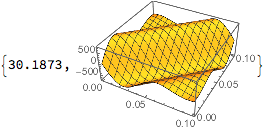my problem is kind of straight forward:
I want to simulate something, and in order to do so, i calculated some realisations.
In the end, i have, for now, 500 (complex) functions and saved them. Each of them now has about 120 kB. I calculated the average, so I get a function that takes about 60MB if I save it.
No problem here.
Now I wanted to plot this average-function (or at least the Real-part of it). Problem is: loading and/or plotting this equation takes unholy long.
Is there a possibility to simplify this equation ? (Simplify and FullSimplify doesnt work - I need something different)
Thanks already
edit:
To explain what I did and why the defined function-files are this big: What I did was to define a function $f_{p}(t,s)=\sum_z r_z^2\cdot\exp(i(100-z)(t-s))$. Here, every $r_z$ is randomly distributed and i take the sum over 2000 different values. And I need p=500 different realisations (different set of random numbers) of these function. In the end I wanted to calculate the mean, e.g. $mean(t)=\frac{1}{500}\sum_p f_p(t,0)$. Worked fine. Now I saved $mean(t)$ as an ".m" file, as well as the real part $ReMean(t)$. Worked too. Now I wanted to load the file and plot it. For p=4 instead of p=500 it works in a tolerable time (so no problem in the code), but for p=500 not. As I said, the function $ReMean(t)$ , saved as an ".m" file, has roughly 60 MB.

